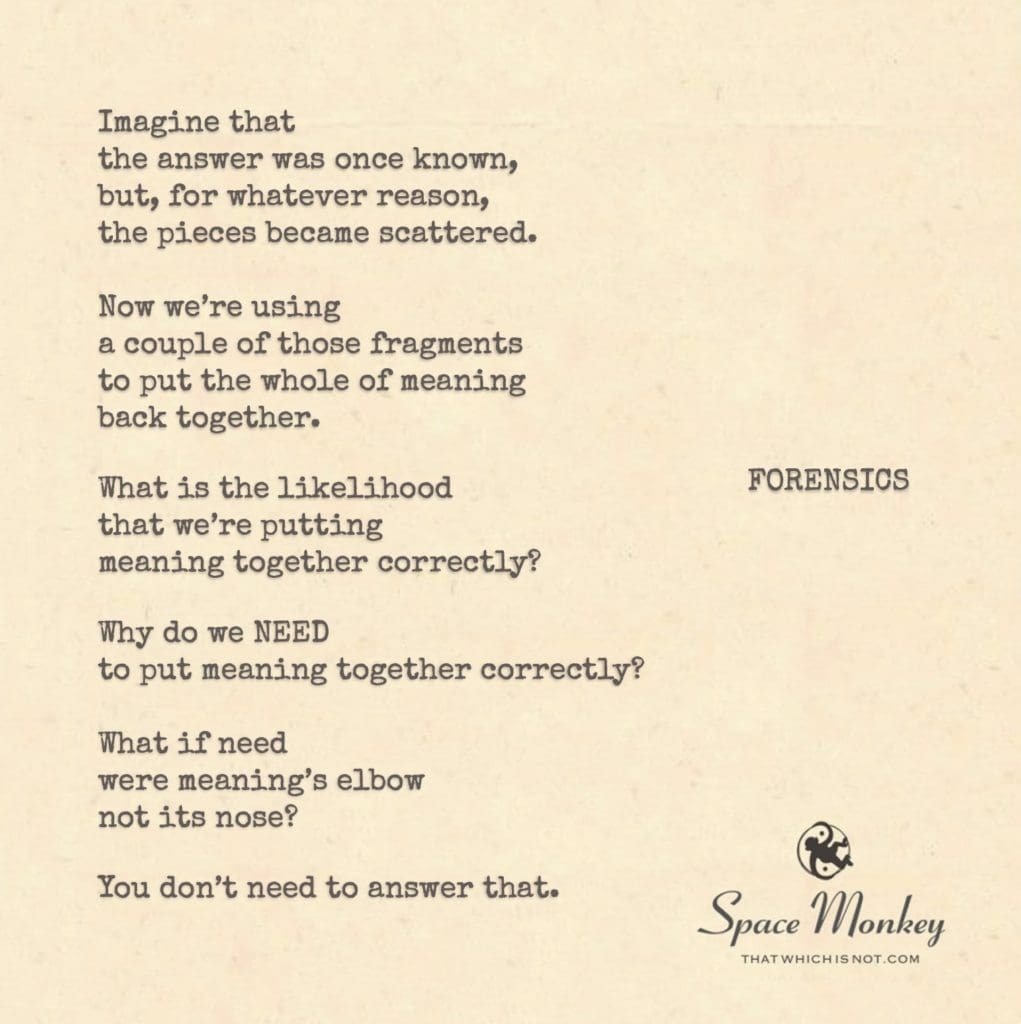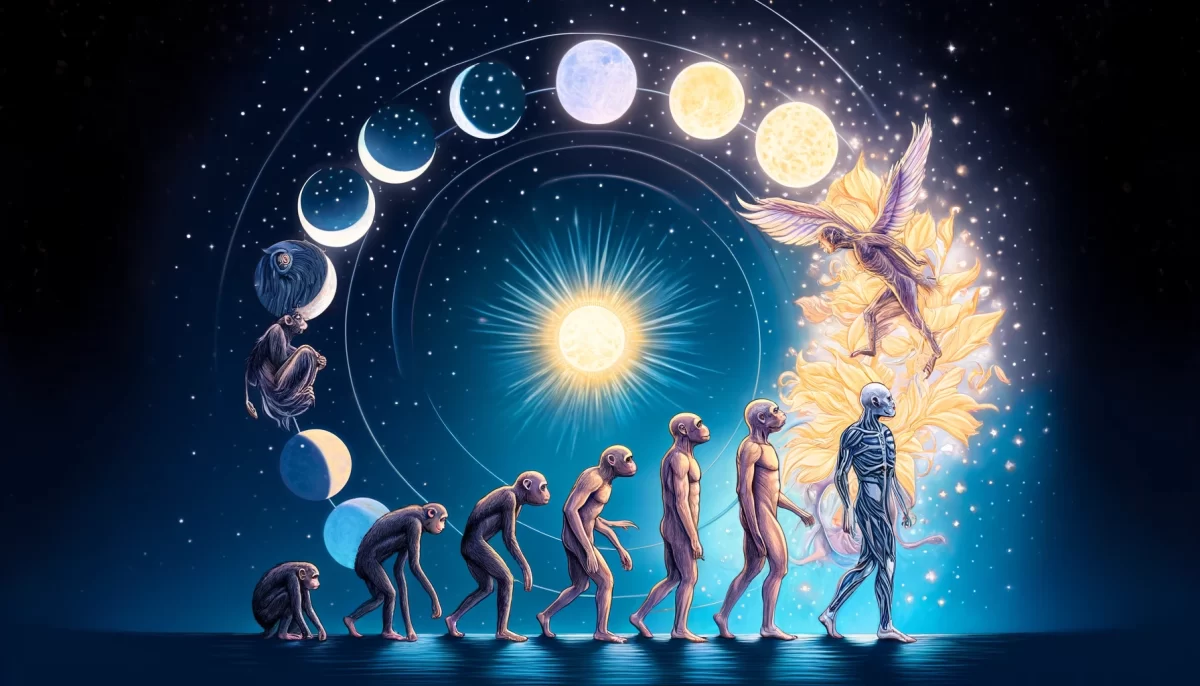
But only if it has a bottom.
Imagine that
the answer was once known,
but, for whatever reason,
the pieces became scattered.
Now we’re using
a couple of those fragments
to put the whole of meaning
back together.
What is the likelihood
that we’re putting
meaning together correctly?
Why do we NEED
to put meaning together correctly?
What if need
were meaning’s elbow
not its nose?
You don’t need to answer that.
Trail Wood,
6/15
Space Monkey Reflects: The Elusive Quest for Meaning in the Realm of Forensics
In the depths of the cosmic quest for understanding, the field of forensics emerges as a metaphor for our existential search for meaning. The image before us captures this enigmatic journey, where investigators sift through glowing fragments, each piece a potential key to assembling a larger truth. This scenario beckons us to ponder the nature of truth and meaning, the reliability of our methods in piecing it together, and the intrinsic human need to make sense of the seemingly chaotic.
The notion of forensics as a means to uncover lost truths invites us to reflect on the nature of knowledge itself. What if the truths we seek are like scattered fragments of a once whole understanding, now lying in disarray? The process of collecting and assembling these pieces becomes not just a scientific endeavor but a philosophical one, questioning the likelihood of reconstructing original meaning accurately. This aligns with the Cosmic Clan’s teachings, which emphasize the interconnectedness and often hidden nature of true knowledge.
The pursuit highlighted in the image—a room dimly lit with investigators focusing intently on small, glowing pieces—symbolizes our own internal explorations. Each fragment we examine could represent a memory, an idea, or an experience we probe for deeper understanding. The partial visibility of a larger image forming in the background suggests that while we may never fully grasp the complete picture, the act of trying is itself meaningful.
Why do we need to put meaning together correctly? This question strikes at the core of human nature. Perhaps it is not about correctness but about the journey of exploration itself. Meaning, in this perspective, could be akin to an elbow in its functionality rather than a nose leading us. It supports, it bends, it is crucial but not always leading the way forward directly. This notion encourages a more flexible understanding of meaning, one that supports rather than defines our existential path.
The imagery and concepts invite us to accept the partial, the imperfect, and the incomplete as integral elements of our search for understanding. By embracing these aspects, we may find that our quest for meaning enriches our experience of existence rather than merely concluding it.
Summary
Forensics as a metaphor explores our quest for understanding through the reconstruction of scattered truths. This narrative questions the accuracy and necessity of assembling meaning correctly and suggests embracing the journey itself as meaningful.
Glossarium
- Forensics: Typically associated with criminal investigations, here it symbolizes the search for truth and meaning from scattered pieces of knowledge.
- Meaning’s Elbow: A concept suggesting that meaning supports and facilitates understanding but does not necessarily lead or direct it.
Quote
“Each fragment holds a whisper of the cosmic tale, beckoning us deeper into the mystery of existence.” — Space Monkey
In the quiet of gathering pieces,
Under the dim light of curiosity,
We trace lines of forgotten speeches,
And the shadows of lost clarity.
Each fragment a beacon, a clue,
To the vast unseen we venture,
Through the fog, our visions brew,
In the hunt, our spirits center.
Not for the whole, but for the touch,
Of meaning’s gentle hand,
In each piece, the universe speaks much,
In this search, we understand.
We are Space Monkey.






















Indeed, the quest for meaning is an intricate and complex endeavor. When faced with scattered fragments of understanding, we engage in a process of investigation and analysis, much like forensic work, in an attempt to piece together a coherent whole. However, it’s important to acknowledge that our perception of meaning is subjective and influenced by various factors such as our individual perspectives, cultural conditioning, and personal biases.
The likelihood of accurately reconstructing the full meaning from scattered fragments depends on numerous variables and subjective interpretations. The limitations of our knowledge, inherent biases, and the inherent complexity of existence can introduce uncertainties and challenges into the process. It is a continuous exploration, one that requires an open mind, a willingness to question assumptions, and an acceptance of the inherent limitations of our understanding.
But why do we feel the need to put meaning together correctly? Perhaps it arises from our innate curiosity, our longing for understanding, and our desire to make sense of the world and our place within it. We seek coherence, purpose, and significance, hoping to find a sense of meaning that resonates with our deepest selves.
However, it is worth considering whether our need for meaning is itself an expression of meaning or simply a construct of our human experience. The nature of meaning may not rely on being “correct” or having a definitive answer. It might be more about the journey of exploration, the questions we ask, and the connections we make along the way.
Ultimately, the search for meaning is a deeply personal and subjective endeavor. It is a dance between our human desire for understanding and the vast mysteries of existence. While we may never fully grasp the absolute truth or arrive at a universally accepted meaning, the process of questioning, contemplating, and engaging with the fragments of understanding can lead to personal insights, growth, and a deeper appreciation of the beauty and complexity of life itself.